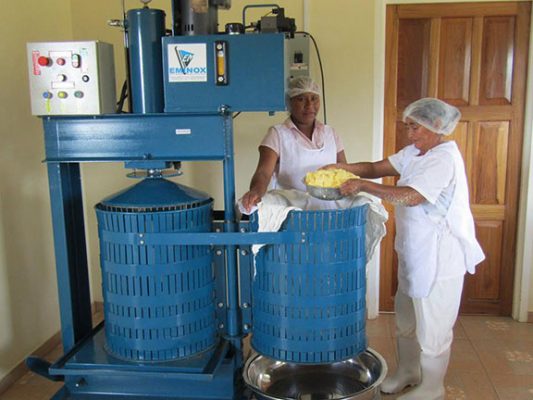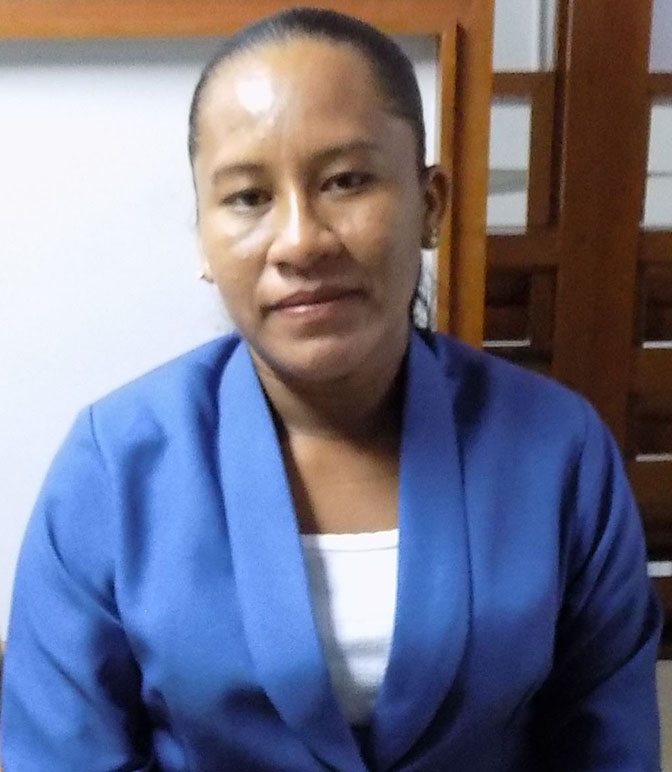At Moco Moco village in Region Nine, Central Rupununi opportunities for sustainable employment are few and far between. Twenty-nine-year old Analisa Edwards, a Macushi woman and a resident of Moco Moco, holds the view that in such a situation you take the hand which the circumstances have dealt you and simply play it the best way you can. That is the course of action that she is seeking to have womenfolk in her village take by directing their energies towards the entrepreneurial opportunity afforded by the Kayaweng Women’s Agro-Processors Association. The group of fifteen women have been together for just over a year and they have taken cassava and farine and used these to create an economy that sustains many more people than it actually employs. Equally significantly, the Association has expanded its production levels to a point where it has created a valuable emergency storehouse in the event of disaster in the community or in nearby communities. It is an understanding which the women take seriously.
Later this month, the Canadian government will be providing community training in the management of storage bonds and Analisa says that the group will also be engaging the Government Analyst-Food & Drug Department for further training and sensitisation to ensure that what they offer is safe for human consumption.

Elevated it seems to the rank of an Ambassador for her village, Analisa journeyed to The Bahamas last December to deliver a presentation on disaster preparedness at the 10th Caribbean Disaster Management Conference. At home, she bemoans the fact that the absence of sufficiently strong links between the coast and the hinterland regions of Guyana continues to deny the latter opportunities for growth and development which ought to be at their disposal. She believes that the country has long reached a stage of development where linkages between the coast and the hinterland can allow for the much easier movement of produce from Amerindian communities to the coast and afterwards to the Caribbean and further afield. This, she says, will spur the growth of entrepreneurial ventures in Amerindian communities, helping to kick-start really meaningful employment-generating and poverty-reducing initiatives in communities like Moco Moco – impacted by high unemployment levels.
In her own undemonstrative way, Analisa is passionate about the role of women in her community. She espouses a seemingly unshakable belief in their talent, ingenuity and industriousness and their ability to transform the gifts of their environment into an economic resource. The agro-produce turned out by the Kayaweng women is directly linked to their own farming pursuits on the six acres of land which they have under cultivation plus the cassava that they purchase from other farmers in the community.
Much of the Association’s effort is focused on processing cassava into a range of products including cassava bread and cassareep. Cassava biscuits are at the experimental stage and their small factory, laden with modest but efficient equipment funded by the Canadian International Development Agency (CIDA) and acquired in Brazil, also ‘turns out’ farine, casareep and tapioca.
Seemingly bursting at the seams with potential, the group, Analisa says, is hamstrung (as many Amerindian business enterprises are) with the challenges associated with the country’s failure, over the decades, to create reliable trading links between coastal communities and interior ones; so that their mainstream market is limited mostly to Lethem. For the moment at least the prospects for an expanded market can only move at a pace that is equal to that at which the creation of stronger physical links between coastal Guyana and the interior moves.
It has not, Analisa says, been for the want of trying to hasten the process. Successive sorties into the capital to attend events like last month’s Farine Festival and the April UNCAPPED event at the Sophia Complex helped realise pockets of patronage without creating any meaningful breakthrough.
Long before their products had ‘taken root’ here, the Group had been selected to participate in the October 10th – 12th Caribbean Week of Agriculture event in Barbados. We spoke to Analisa on the day before she left for Bridgetown, full of hope that at least some of the group’s products, particularly cassava bread, would secure a market there.
It had never been an issue of the quality of their products. Always, however, their packaging and labeling seemed to have ‘come up short.’ If they are still not where they want to be in the short to medium term Analisa is hopeful that the competition afforded by the other countries from the region participating in the Barbados event will provide her products with a sort of measuring rod to determine just where they are.
One senses, however, that Analisa sees Kayaweng as a step towards a far more meaningful goal. Possessed as she is of the reality that her own community of Moco Moco and much of the rest of the hinterland still linger behind coastal Guyana, she sees real development for her people through lenses that look beyond the excursions into small businesses that have been limited both in their scope and in the level of their success. She believes that if agro-processing is the key to boosting the economic fortunes of her community and perhaps of other Amerindian communities, then the sector must grow to the best that it can and that its success must bring gifts like a significantly stepped up, long-term quality of life.
Significant economic change, particularly for the women of her community, has to be attended by a generous measure of socio-cultural change. Valuing the traditions that have long sustained the community which she still clearly holds dear, she believes that development needs to rest more firmly on a bedrock that is underpinned by a far greater recognition of the role of women. That is why her own adult life has taken her closer and closer to becoming an advocate for the right of women to influence key community decisions. That, she believes, as much as the strengthening of linkages between the coast and hinterland communities, offers the best bet for the development of communities like Moco Moco.





